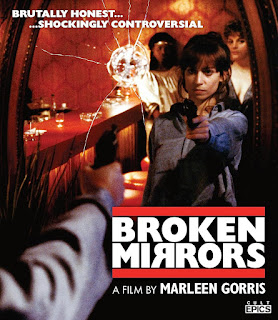Broken Mirrors
There’s no shortage of stories to tell about male-female power relationships. And there’s probably no better setting for such material than a business that focuses on the world’s oldest profession. Dutch filmmaker Marleen Gorris’ second feature film, Broken Mirrors (1984), takes place in an Amsterdam brothel which employs a score of women desperate enough to “rent” themselves out for the right price. But while the money rolls in, the psychological costs keep adding up.
Diane (Lineke Rijxman) is the newest recruit, who learns the ins-and-out of the job from Dora (Henriette Tol), a callous but kind mentor suffering from her own emotional crisis. Ellen (Coby Stunnenberg) manages the business with as many safety precautions as possible, but the male owner is always willing to compromise to make a quick buck. In a split narrative, the film also follows the exploits of a faceless serial killer who kidnaps unsuspecting housewives and tortures them in a basement apartment. Is the murderer also a client? And exactly how will the two stories intersect?
Gorris’ previous film, A Question of Silence (1982), was a moody and unpredictable feminist manifesto. It exposed a raw nerve of fears and psychoses lurking inside both genders. Broken Mirrors is far more conventional, predictable and polished. That’s not to say its uninteresting. The personal and professional lives of the sex workers are realized with an anguishing amount of sympathy. Gorris goes out of her way to emphasize the tedium, apathy and terror inherent in earning a living at the mercy of men’s desires. And the similarities between treatment at the hands of one madman versus another is only too clear cut.
And therein lies the flaw in the film’s narrative, one that belabors each metaphorical point rather than letting audience’s draw their own conclusions. Make no mistake, Broken Mirrors is still a powerful profile of male domination and manipulation with performances of the highest order across the board. And while Gorris’ cinematic techniques have improved, her intentions seem too obvious.
Following up their release of A Question of Silence, Cult Epics obviously isn’t putting these out for show. Gorris’ work is worth watching for anyone who appreciates great cinema, regardless of your gender politics. The new Blu-ray is created from a 4K transfer of the original negative and includes a brief televised interview with author and sex-worker rights advocate Margo St. James along with a commentary track from Dutch film scholar Peter Verstraten.




Comments
Post a Comment